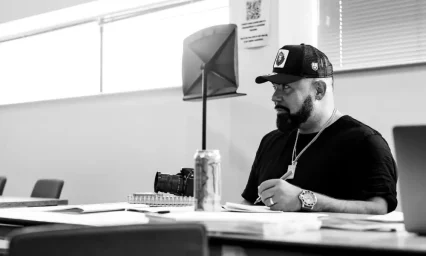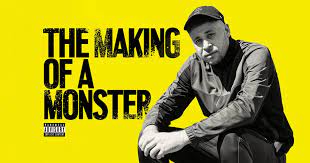Created from grime culture and inspired by Dizzee Rascal, Wiley, Skepta and Kano, The Wales Millennium Centre will play host to a brand new show, The Making Of A Monster, this November. Billed as a Grime-Theatre mash-up, the show tells the story of Connor Allen, growing up mixed-race in Newport. Emma Schofield spoke to the show’s Director, Conrad Murray about the art of collaboration and why the show is a platform for the future of Grime music in Wales.
Emma Schofield: You’ve talked in the past about collaboration as a craft in its own right, a craft which I’m assuming must have come in to play here. I’m intrigued by the idea of a Grime/theatre mash-up. For many people that’s probably not an obvious pairing, where did you start with bringing those two very different spaces together?
Conrad Murray: Collaboration is definitely a craft in and of itself, which I am always looking to improve on! Establishing and finding common ground can be a great way to start collaborating. My background is mainly in hip hop theatre, which I think could be why I was approached about working on The Making Of A Monster. Connor’s interest in Grime music meant there was a synergy and common understanding there. Grime is a UK version of Hip hop, or you could classify it as a subculture within it. There has never been a fusion of Grime and Theatre, so it was an interesting combination and exciting to create a new form. Anything new is appealing and potentially dangerous. The UK’s first piece of Grime music theatre. And premiering in Cardiff! BOOM!
There was an interesting use and allusion of Grime music and culture within the original scratches and

script for The Making Of A Monster and my approach was to fully delve into this. When me and Connor spoke about hip hop culture – the music, the fashion, the language- he was animated and passionate. Hip hop culture is often the language of the oppressed, the working class and Black and immigrant communities. Connor’s story sat at an interesting intersection of these. Welsh- but mixed race. He also comes from a working class background. Grime music gave him energy and inspiration. It gives kids all around the country a voice.
Emma Schofield: With that voice in mind, wow do you approach directing something like this within a setting like the Wales Millennium Centre? This is being performed in the Weston Studio, so you’ve got quite a flexible space to channel that energy and power into…
Conrad Murray: It was about trying to create the excitement of a Grime gig, both intimate and stadium level and setting at the Wales Millennium Centre. Working with TK Hay the designer, we were able to create a playing space which could work with some of the abstractions and dexterous nature of Connor’s writing, but also allow for us to create a definite setting and energy. The whole set can be projected onto, which allows us to create a Skepta Brit awards level show for sections of the play.
Emma Schofield: The music and the culture surrounding it are central to the show, but there are some incredibly sensitive issues woven into this through that music (domestic abuse and violence, questions surrounding racism and identity in Wales – a topic which, as it happens, has been very much in the news over the past few weeks). As a director, where do you start when it comes to handling those kind of themes? I’m thinking particularly of how you steer the presentation of those topics and really allow Connor’s voice to come to the fore and tell his own story here.
Conrad Murray: Yes it feels very current and prescient, that Rakie Ayola’s story was unravelling whilst I was in Wales working on this show. It made the show feel even more important, although it was already an important story to tell. Whilst being in Wales I have been slowly coming to terms with the racism and nationalism. Occasionally in my life people have spoken to me like I wasn’t really British. But this is even more complex in Wales, as there is race and the Welsh Language conversation. The show doesn’t deal with all of this head on, but it is there, as Connor is Black and Welsh, and speaks English. With the show being presented by the Wales Millennium Centre, this context is always there.
To start off with, I shared my story with Connor, I’m also mixed race and have had run ins with the law before finding my way. Connor was also quite frank in sharing his story with me. Both being mixed heritage meant that we had experienced some of the same situations and had similar reflections.
I think that having a shared experience can help and the Wales Millennium Centre has worked very diligently (shout out to [Head of Productions] Emma Evans) in putting together a great team with shared values. We have had discussions on race, politics and class which helps to create a shared understanding. Not that we all agree – we often don’t! But an understanding and shared vision always helps. So this is a Welsh story, but also a complicated and universal story. A story of ‘Where do I fit in?’ ‘Who am I?’ A story of redemption and acceptance to some degree.
Emma Schofield: Quite often we talk about what makes a show different and why it might stand out, but in this case The Making of a Monster is already quite different from the kind of production we’re used to seeing in theatres in Wales. Do you think we can expect to see more of this kind of collaborative work in the future?
Conrad Murray: D Double E was performing at the Wales Millennium Centre whilst I’ve been there and Ghetts face timed our rehearsal room! Wales has a strong Grime culture. It may be smaller than London, but the intensity and love for it is similar if not greater than in London. There are many MCs and artists who are part of a scene. Man Like Vision was just nominated for a youth music award whilst I was there in London, and there is a sick mural of Mace the Great nearby the Centre. I think that the theatre and arts will and need to collaborate with these artists, as they are the future! I’m already excited about the cross collaborations which will happen.
Not to say I’m Grime establishment – I’m not- But I have opened for Stormzy, and I’ve been excited about working with the team at the WMC and being in the building. The energy around this show needs not to dissipate and must continue into new forms and with new artists.
Emma Schofield: Along those lines, Wales isn’t necessarily somewhere which is traditionally associated with the Grime music scene and yet there are pockets where it is really starting to build momentum. Do we need to be looking for new ways to better reflect that shift in our culture?
Conrad Murray: Arts venues and places like the WMC need to make sure that this isn’t just a one-off show or a moment. This is part of a movement towards the future and creating and cultivating the artists and audiences of the future.
I also think there is something to be said for ambition and respect. Sometimes artists tend to leave the places they grow up in and which supported them and head for particular cultural hubs, be in London or Bristol. The Wales Millennium Centre said that Cardiff is the centre of the Earth, and made the culture come here. They are ambitious enough to take creative risks to create the best work.
This is what having total respect for your artist and the artform is. We have the very best creative team on this show from award-winning designers, to the video designers for Jay-Z and Beyoncé. Musician and composer of the show, Oraine, is an incredible drummer and performer who plays live throughout the show creating an intensifying atmosphere. Gambit Ace is a respected and published rapper and freestyler who has played festivals up and down the country and within many cross collaborative and theatre productions.
Emma Schofield: Obviously, the show will run for ten days in November, but what do you hope the longer-term impact of a production like The Making Of A Monster might be?
Conrad Murray: I know that in the audience (and hopefully onstage, as a curtain raiser) future Wales Millennium Centre and Welsh artists will feel that they can own the Weston themselves and create there and contribute to and add to the creative culture in Wales. I’m excited about the Hip Hop academy at the Centre, and I hope that they will be in the main programme selling it out and inspiring the rest of the UK.
Emma Schofield: What would you say to anyone who doesn’t have much experience of Grime music, but might be thinking about coming to see The Making Of A Monster?
Conrad Murray: It is a great original story. A fascinating true story about a Welsh man who was convicted of assaulting his mother and dealing with his absent father. And if you ever wanted to be around when ground-breaking theatre or music was being made, then be in the room as it happens.
The Making of a Monster plays in the Weston Studio at the Wales Millennium Centre from the 9th-19th November. A trailer for the show can be viewed here.












